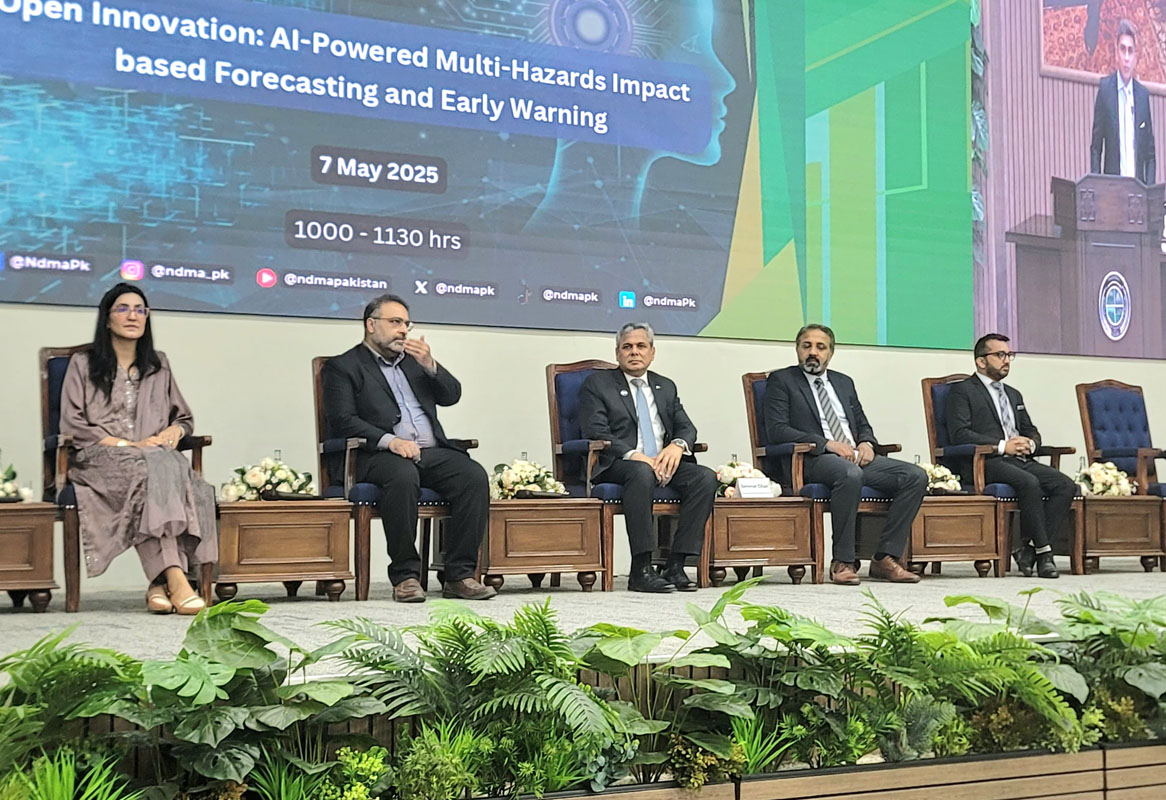7th May 2025, Islamabad – Pakistan: In a resounding affirmation of COMSATS’ enduring commitment to fostering regional resilience and technological foresight, His Excellency Ambassador Dr. Mohammad Nafees Zakaria, Executive Director of COMSATS, chaired a high-level seminar at the 2nd Pakistan Expo on Disaster Risk Reduction (PEDRR-2025). Convened under the aegis of the National Disaster Management Authority (NDMA), Government of Pakistan, the Expo served as a confluence of national resolve and global innovation, dedicated to advancing Pakistan’s disaster risk governance and climate resilience.

The high-profile event, graced by the presence of H.E. Dr. Musadiq Malik, Federal Minister for Climate Change and Environmental Coordination, drew participation from senior policymakers, representatives of multilateral agencies, scholars, and industry pioneers. The Expo underscored Pakistan’s unwavering commitment to mitigating disaster risks amidst its heightened climate vulnerability, while also providing a strategic platform for knowledge diplomacy, policy convergence, and technological collaboration.

H.E. Ambassador Dr. Zakaria chaired the thematic Seminar 3: “Open Innovation: AI-Powered Multi-Hazard Impact-Based Forecasting and Early Warning”, which featured eminent domain experts including Dr. Rizwan Riaz (Pro-Rector, NUST), Dr. Tayyab (GM Risk Assessment, NDMA), Ms. Zahra Hassan (GM GIS, NDMA), Dr. Ali Hassan (NUST), and Dr. Hammad Majeed (Genesys Research Lab). The session facilitated a robust discourse on harnessing artificial intelligence and emerging digital technologies to strengthen early warning systems and reduce the socioeconomic toll of climate-induced hazards.
In his address, Dr. Zakaria underscored the pivotal role of Artificial Intelligence (AI), quantum technologies, and big data analytics in transforming disaster preparedness and mitigation. Citing the World Meteorological Organization’s (WMO) sobering statistic of over 2 million fatalities and $4.3 trillion in economic losses due to weather-related disasters between 1970 and 2021, he called for an urgent and integrated technological response.
technologies, and big data analytics in transforming disaster preparedness and mitigation. Citing the World Meteorological Organization’s (WMO) sobering statistic of over 2 million fatalities and $4.3 trillion in economic losses due to weather-related disasters between 1970 and 2021, he called for an urgent and integrated technological response.
He underscored COMSATS’ pivotal role as an intergovernmental platform comprising 27 member states and a robust network of 25 Centres of Excellence (CoEs), several of which are at the forefront of deploying AI-powered solutions for flood modeling, drought forecasting, seismic hazard mapping, and real-time environmental monitoring. Dr. Zakaria further expounded on the transformative potential of AI in anticipating climate-induced displacement, simulating disaster scenarios through digital twins, and augmenting the precision of early warning systems through the integration of quantum computing.
However, in tandem with optimism, he highlighted cautionary imperatives: the need for accountability frameworks in AI decision-making, the development of explainable and ethical AI models, safeguarding cyber-physical systems from intrusion, and ensuring that local vulnerabilities and indigenous knowledge systems are coherently integrated into AI-based risk assessments.
The PEDRR-2025 Expo served as a compelling demonstration of Pakistan’s forward-leaning approach to climate adaptation and its ambition to spearhead innovation-driven and globally collaborative solutions. In this context, COMSATS reaffirmed its unwavering commitment to fostering inclusive, AI-enabled, and contextually grounded resilience architectures—aligned with international disaster risk reduction frameworks and the overarching vision of South-South cooperation.

The event concluded with a strong emphasis on cross-sectoral partnerships and transnational collaboration, aligning national priorities with global frameworks such as the Sendai Framework for Disaster Risk Reduction and the 2030 Agenda for Sustainable Development.
As a longstanding institutional partner of NDMA, COMSATS continues to play a catalytic role in regional capacity-building and disaster response innovation. Reinforcing this collaboration, an MoU was formalized between COMSATS Internet Services (CIS) and NDMA, marking a strategic step toward leveraging digital technologies—including tele-health and ICT-enabled training—for improved disaster readiness and humanitarian response.







